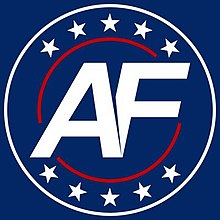Neoconservatism is a political movement that began in the United States and the United Kingdom during the 1960s during the Vietnam War among foreign policy hawks who became disenchanted with the increasingly pacifist Democratic Party and with the growing New Left and counterculture of the 1960s. Neoconservatives typically advocate the unilateral promotion of democracy and interventionism in international affairs, grounded in a militaristic and realist philosophy of "peace through strength." They are known for espousing opposition to communism and political radicalism.
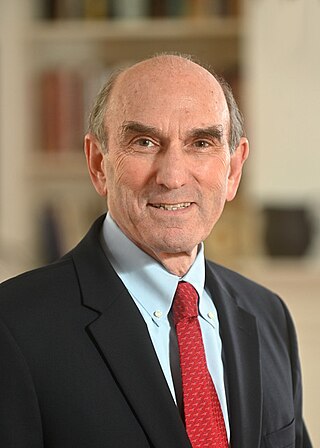
Elliott Abrams is an American politician and lawyer, who has served in foreign policy positions for presidents Ronald Reagan, George W. Bush, and Donald Trump. Abrams is considered to be a neoconservative. He is currently a senior fellow for Middle Eastern studies at the Council on Foreign Relations. He served as the U.S. Special Representative for Venezuela from 2019 to 2021 and as the U.S. Special Representative for Iran from 2020 to 2021.

John Robert Bolton is an American attorney, diplomat, Republican consultant, and political commentator. He served as the 25th United States Ambassador to the United Nations from 2005 to 2006, and as the 26th United States National Security Advisor from 2018 to 2019.
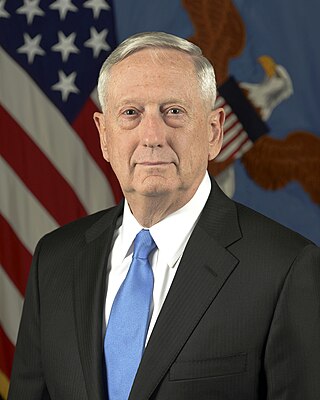
James Norman Mattis is an American military veteran who served as the 26th United States secretary of defense from 2017 to 2019. A retired Marine Corps four-star general, he commanded forces in the Persian Gulf War, the War in Afghanistan, and the Iraq War.

Death to America is an anti-American political slogan widely used in North Korea, Iran, Afghanistan, Lebanon, Yemen, Iraq, and Pakistan. Originally used by North Korea since the Korean War, Ruhollah Khomeini, the first supreme leader of Iran, popularized the term. He opposed the chant for radio and television, but not for protests and other occasions.

The United States foreign policy toward the People's Republic of China originated during the Cold War. At that time, the U.S. had a containment policy against communist states. The leaked Pentagon Papers indicated the efforts by the U.S. to contain China through military actions undertaken in the Vietnam War. The containment policy centered around an island chain strategy. President Richard Nixon's China rapprochement signaled a shift in focus to gain leverage in containing the Soviet Union. Formal diplomatic ties between the U.S. and China were established in 1979, and with normalized trade relations since 2000, the U.S. and China have been linked by closer economic ties and more cordial relations. In his first term as U.S. president, Barack Obama said, "We want China to succeed and prosper. It's good for the United States if China continues on the path of development that it's on".

Russia and the United States maintain one of the most important, critical and strategic foreign relations in the world. Both nations have shared interests in nuclear safety and security, nonproliferation, counterterrorism, and space exploration. Due to the Russian invasion of Ukraine, relations became very tense after the United States imposed sanctions against Russia. Russia placed the United States on a list of "unfriendly countries", along with Taiwan, South Korea, Japan, Singapore, European Union members, NATO members, Australia, New Zealand, Switzerland, Micronesia, and Ukraine.

Victoria Jane Nuland is an American diplomat who served as Under Secretary of State for Political Affairs from 2021 to 2024. A former member of the US Foreign Service, she served as Assistant Secretary of State for European and Eurasian Affairs from 2013 to 2017 and the 18th U.S. ambassador to NATO from 2005 to 2008. Between July 2023 and February 2024, Nuland served as acting deputy secretary of state following the retirement of Wendy Sherman.
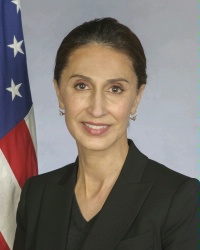
Azita Raji was an Iranian-born American diplomat, banker, and philanthropist. She was nominated by President Barack Obama in October 2014 to serve as the United States ambassador to the Kingdom of Sweden, and confirmed unanimously by the United States Senate in February 2016. She presented her credentials to King Carl XVI Gustaf on March 15, 2016, and completed her tour of duty on January 20, 2017.
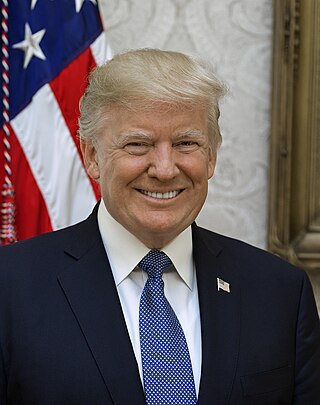
Donald Trump's tenure as the 45th president of the United States began with his inauguration on January 20, 2017, and ended on January 20, 2021. Trump, a Republican from New York City, took office following his Electoral College victory over Democrat nominee Hillary Clinton in the 2016 presidential election, in which he lost the popular vote to Clinton by nearly three million votes. Upon his inauguration, he became the first president in American history without prior public office or military background. Trump made an unprecedented number of false or misleading statements during his campaign and presidency. His presidency ended following his defeat in the 2020 presidential election to former Democratic vice president Joe Biden, after one term in office.

The inauguration of Donald Trump as the 45th president of the United States marked the commencement of Donald Trump's term as president and Mike Pence's term as vice president. An estimated 300,000 to 600,000 people attended the public ceremony held on Friday, January 20, 2017, at the West Front of the United States Capitol in Washington, D.C. The event was the 58th presidential inauguration. Held in Washington, D.C., from January 17 to 21, 2017, inaugural events included concerts, the swearing-in ceremony, a congressional luncheon, parade, inaugural balls, and the interfaith inaugural prayer service. The inauguration was protested worldwide.

Donald Trump assumed office as president of the United States on January 20, 2017, and his term ended on January 20, 2021. The president has the authority to nominate members of his Cabinet to the United States Senate for confirmation under the Appointments Clause of the United States Constitution.

The first 100 days of Donald Trump's presidency began on January 20, 2017, the day Donald Trump was inaugurated as the 45th president of the United States. The first 100 days of a presidential term took on symbolic significance during Franklin D. Roosevelt's first term in office, and the period is considered a benchmark to measure the early success of a president. The 100th day of his presidency ended at noon on April 30, 2017.

This article describes the foreign policy positions taken by Donald Trump during his 2016 presidential campaign.

The social policy of the Donald Trump administration was generally socially conservative. As of 2016, Donald Trump described himself as pro-life with exceptions for rape, incest, and circumstances endangering the life of the mother. He said he was committed to appointing justices who may overturn the ruling in Roe v. Wade. Trump appointed three Supreme Court justices during his presidency. All of them later went on to vote in the majority opinion of Dobbs v. Jackson Women's Health Organization, the Supreme Court case overturning Roe v. Wade and ending federal abortion rights nationwide.

U.S. foreign policy during the presidency of Donald Trump (2017–2021) was noted for its unpredictability and reneging on prior international commitments, upending diplomatic conventions, embracing political and economic brinkmanship with most adversaries, and stronger relations with traditional allies. Trump's "America First" policy pursued nationalist foreign policy objectives and prioritized bilateral relations over multinational agreements. As president, Trump described himself as a nationalist while espousing views that have been characterized as isolationist, non-interventionist, and protectionist, although the "isolationist" label has been disputed, including by Trump himself, and periods of his political career have been described by the alternative term “semi-isolationist.” He personally praised some populist, neo-nationalist, illiberal, and authoritarian governments, while antagonizing others, even as administration diplomats nominally continued to pursue pro-democracy ideals abroad.

Mira Radielovic Ricardel, is an American businesswoman and former federal political appointee.

Aaron Wess Mitchell is an American foreign policy expert and former diplomat who was the Assistant Secretary of State for European and Eurasian Affairs from October 2017 until February 2019. Prior to assuming the role at State Department, he was president and CEO of the Center for European Policy Analysis. On July 19, 2017, President Donald Trump nominated Mitchell as Assistant Secretary of State for European and Eurasian Affairs.

From 2017 through 2021, Donald Trump was the 45th president of the United States; he is the only American president to have no political or military service prior to his presidency, as well as the first to be charged with a felony after leaving office. He is regarded by historians as one of the worst presidents in U.S. history.


